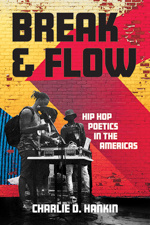Today, we are happy to bring you our conversation with Charlie D. Hankin, author of Break and Flow: Hip Hop Poetics in the Americas.
What inspired you to write this book?
While studying abroad at the University of Havana in 2009, friends took me to an “underground” venue to hear the rap duo Los Aldeanos. At one point, co-founders Aldo and El B simulated a rap battle to debate challenges of Cuba’s Special Period and unfulfilled promises of the Cuban Revolution. The audience members rapped along, explaining to me later that things could be said in rap that were off limits in everyday speech. One of the most important themes was the persistence of racism, a taboo topic in a society that many understood to be colorblind. Artists and audience alike believed that rap could change the world. Focusing on Cuba, Brazil, and Haiti, Break and Flow asks how and why rap sounds in the Americas.
What did you learn and what are you hoping readers will learn from your book?
Latin American rap is built around a shared set of references to the United States and hip hop’s origin myth in New York City. However, far from a copy of US rap, the practice acquires new genealogies, forms, and functions. Hip hop in the Americas is locally-rooted and globally-facing: an ongoing exploration of the past and present of colonialism and slavery and a map of possible futures. Break and Flow focuses on hip hop poetics to highlight the writing techniques of rappers. Equally important as what is said is how it is said. Ultimately, rap is a community writing practice, a sharing of beats and lyrics or breaks and flows.
What surprised you the most in the process of writing your book?
Most surprising in the process of research and writing was the receptiveness of artists to my project and to me as an outsider. Artists consistently welcomed me with open arms, often into their homes to record a track, share a meal, or meet family members and friends. I hope the book reflects the care and generosity with which they shared their knowledge and communities.
What’s your favorite anecdote from your book?
When conducting fieldwork with artists, I would present myself first as a musician and then as a researcher. This led to many rewarding collaborations where I would record violin tracks for artists. It was a privilege collaborating with one of my favorite artists, Haitian rapper D-Fi (mostly sharing audio files via WhatsApp) on the albums Kwonik on GetoYout and R.O.D Rhod over D-Fi. The highlight was a multi-year collaboration in Havana with my dear friend Malcoms “Justicia,” who tragically passed away in 2021. Our compilation album Sentimientos Desafinados (2017) was nominated for a CubaDisco music award and has been called a “classic” of Cuban hip hop.
What’s next?
I’m currently at work on a new book project that expands some of the writing strategies employed by rappers into broader historical contexts. My objective is to focus on the cross-pollination between literature and popular music in Latin America, or what I call music-literature crossings. By tracing the presence of popular music in literature and literature in popular music, I aim to show some of the ways sound has been mobilized in the twentieth century to construct ideas about race and community.





